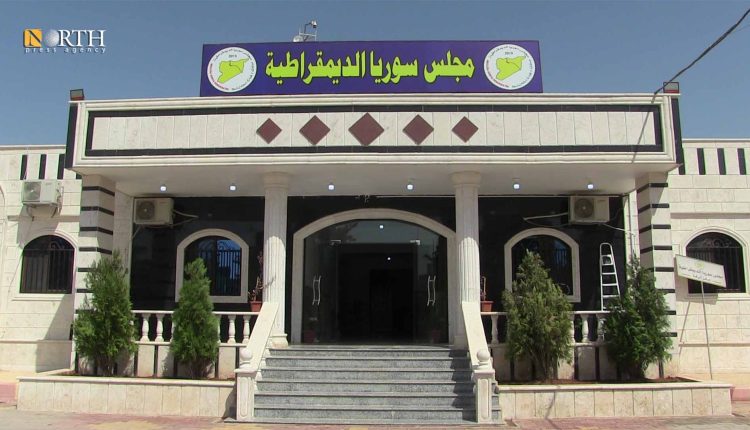Kurdish Council SDC Blames Syrian Government for Unrest inDamascus
By Kardo Roj
QAMISHLI, Syria (North Press) –
The Syrian Democratic Council (SDC), the political wing of the Autonomous Administration of North and East Syria (AANES), on Wednesday held the Syrian government fully responsible for the recent wave of violence and instability in the Damascus suburbs of Jaramana and Ashrafiyat Sahnaya.
In an official statement posted on its website, the SDC condemned what it described as an alarming military escalation and called for an immediate cessation of violence and the initiation of inclusive national dialogue to prevent further deterioration.
Mounting Tensions in Southern Damascus
Tensions erupted early Tuesday in the towns of Jaramana and Ashrafiyet Sahnaya, located in the southern outskirts of Damascus, where armed clashes broke out between government forces and local groups. State media described the opposition as “outlawed elements,” while independent reports indicated rising unrest in Druze-majority areas of the capital’s periphery.
The clashes followed a reported government security crackdown and have fueled growing public unease about the potential spread of instability into the heart of Damascus.
In its statement, the SDC expressed “deep concern over the serious escalation in Ashrafiyet Sahnaya and Jaramana,” warning that the current trajectory could “expand the circle of violence in the capital itself.”
A Call for De-escalation and Accountability
The SDC strongly denounced what it termed as “acts of killing, intimidation, sectarian incitement, and hate speech,” calling on all involved parties to exercise restraint and prioritize civilian safety.
“The excessive use of force will push Syria closer to collapse,” the Council said, warning that such measures only deepen divisions and open the door to increased foreign interference.
Though the SDC did not name any foreign actors explicitly, the statement alluded to regional powers with growing influence in southern Syria—some of whom are widely viewed as vying for long-term strategic leverage within the country.
“The regime’s failure to respond to legitimate demands, and its resort to militarized solutions, has brought Syria to the edge,” the statement added.
Emphasis on Inclusive Dialogue
In keeping with its long-standing political platform, the SDC urged the immediate convening of a comprehensive national conference involving all Syrian components and political forces. The goal, the Council stated, should be “to correct the trajectory of the transitional process, draft a modern democratic constitution, and build a state based on citizenship and justice.”
The SDC has previously promoted a decentralized political model, arguing that any long-term solution to the Syrian crisis must include equal representation for the country’s diverse ethnic and religious communities. As part of its governance framework in the northeast, AANES has implemented such policies, emphasizing inclusivity and local autonomy.
Wednesday’s statement reiterated this vision, calling for a national framework that recognizes the sacrifices made by Syrians across the country and respects their aspirations for justice, dignity, and rights protection.

